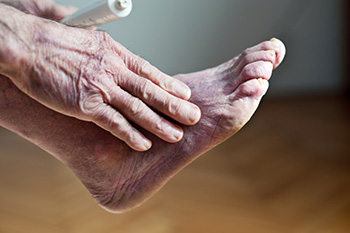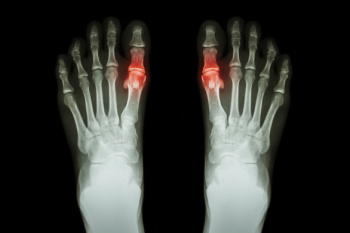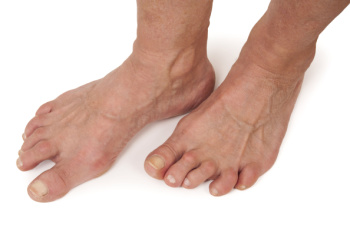Connect With Us
Blog
Items filtered by date: May 2024
Improving Poor Circulation in the Feet

Circulation refers to the movement of blood throughout the body, delivering oxygen and nutrients to tissues while removing waste products. Poor circulation in the feet can lead to various problems and is often caused by conditions such as peripheral artery disease, diabetes, obesity, and prolonged inactivity. Smoking and a sedentary lifestyle also contribute to reduced blood flow. Symptoms of poor circulation in the feet include numbness, tingling, cold feet, swelling, cramping, and skin discoloration. If left untreated, these issues can lead to more severe complications like ulcers, infections, and, in extreme cases, gangrene. Improving circulation involves lifestyle changes such as regular exercise, maintaining a healthy weight, quitting smoking, and eating a balanced diet rich in fruits, vegetables, and whole grains. Wearing compression stockings and elevating the feet can also help. If you have trouble with poor circulation in your feet, it is suggested that you consult a podiatrist for personalized advice and effective treatment options.
While poor circulation itself isn’t a condition; it is a symptom of another underlying health condition you may have. If you have any concerns with poor circulation in your feet contact one of our podiatrists of Southwest Podiatry. Our doctors will treat your foot and ankle needs.
Poor Circulation in the Feet
Peripheral artery disease (PAD) can potentially lead to poor circulation in the lower extremities. PAD is a condition that causes the blood vessels and arteries to narrow. In a linked condition called atherosclerosis, the arteries stiffen up due to a buildup of plaque in the arteries and blood vessels. These two conditions can cause a decrease in the amount of blood that flows to your extremities, therefore resulting in pain.
Symptoms
Some of the most common symptoms of poor circulation are:
- Numbness
- Tingling
- Throbbing or stinging pain in limbs
- Pain
- Muscle Cramps
Treatment for poor circulation often depends on the underlying condition that causes it. Methods for treatment may include insulin for diabetes, special exercise programs, surgery for varicose veins, or compression socks for swollen legs.
As always, see a podiatrist as he or she will assist in finding a regimen that suits you. A podiatrist can also prescribe you any needed medication.
If you have any questions, please feel free to contact our offices located in Dallas, and Carrollton, TX . We offer the newest diagnostic and treatment technologies for all your foot care needs.
Plantar Warts Can Be Treated!
A Guide to Diagnosing Gout

Gout, a form of inflammatory arthritis, can be excruciating, often affecting the big toe and ankles. Recognizing its symptoms is vital for timely management. The diagnosis begins with a keen observation of the symptoms, which are often sudden, intense joint pain, swelling, redness, and warmth, typically striking at night or in the early hours. The affected joint might feel tender to the touch, making even the lightest pressure unbearable. An accurate diagnosis often involves a comprehensive medical history review and a physical examination by a podiatrist. They may also conduct tests like joint fluid analysis to detect urate crystals, which are consistent with gout. Blood tests measuring uric acid levels can aid in confirmation, although high levels do not always guarantee a diagnosis. Imaging tests, such as X-rays, may reveal joint damage in chronic cases. If you have pain in the top of your foot, with a focus on the big toe, it is strongly suggested that you contact a podiatrist who can effectively treat gout.
Gout is a painful condition that can be treated. If you are seeking treatment, contact one of our podiatrists from Southwest Podiatry. Our doctors will treat your foot and ankle needs.
What Is Gout?
Gout is a form of arthritis that is characterized by sudden, severe attacks of pain, redness, and tenderness in the joints. The condition usually affects the joint at the base of the big toe. A gout attack can occur at any random time, such as the middle of the night while you are asleep.
Symptoms
- Intense Joint Pain - Usually around the large joint of your big toe, and it most severe within the first four to twelve hours
- Lingering Discomfort - Joint discomfort may last from a few days to a few weeks
- Inflammation and Redness -Affected joints may become swollen, tender, warm and red
- Limited Range of Motion - May experience a decrease in joint mobility
Risk Factors
- Genetics - If family members have gout, you’re more likely to have it
- Medications - Diuretic medications can raise uric acid levels
- Gender/Age - Gout is more common in men until the age of 60. It is believed that estrogen protects women until that point
- Diet - Eating red meat and shellfish increases your risk
- Alcohol - Having more than two alcoholic drinks per day increases your risk
- Obesity - Obese people are at a higher risk for gout
Prior to visiting your podiatrist to receive treatment for gout, there are a few things you should do beforehand. If you have gout you should write down your symptoms--including when they started and how often you experience them, important medical information you may have, and any questions you may have. Writing down these three things will help your podiatrist in assessing your specific situation so that he or she may provide the best route of treatment for you.
If you have any questions, please feel free to contact our offices located in Dallas, and Carrollton, TX . We offer the newest diagnostic and treatment technologies for all your foot care needs.
Recognizing Signs of Rheumatoid Arthritis in the Feet

Rheumatoid arthritis, or RA, can manifest in various parts of the body, including the feet, where early detection is vital for effective management and prevention of complications. One common sign of RA in the feet is joint stiffness, particularly in the morning or after periods of inactivity, which can make walking and movement uncomfortable. Swelling and tenderness in the affected joints, often accompanied by warmth and redness, are also indicative of RA. Deformities such as bunions, hammertoes, and claw toes may develop as the condition progresses, altering the foot's structure and causing further discomfort. Additionally, RA can lead to nodules or lumps under the skin, typically around pressure points like the heels or toes. Changes in gait or difficulty in walking due to foot pain and stiffness are further indications of RA involvement. If you are experiencing symptoms of RA that are affecting your feet, it is suggested that you visit a podiatrist who can offer you relief and treatment strategies.
Because RA affects more than just your joints, including the joints in your feet and ankles, it is important to seek early diagnosis from your podiatrist if you feel like the pain in your feet might be caused by RA. For more information, contact one of our podiatrists of Southwest Podiatry. Our doctors will assist you with all of your podiatric concerns.
What Is Rheumatoid Arthritis?
Rheumatoid Arthritis (RA) is an autoimmune disorder in which the body’s own immune system attacks the membranes surrounding the joints. Inflammation of the lining and eventually the destruction of the joint’s cartilage and bone occur, causing severe pain and immobility.
Rheumatoid Arthritis of the Feet
Although RA usually attacks multiple bones and joints throughout the entire body, almost 90 percent of cases result in pain in the foot or ankle area.
Symptoms
- Swelling and pain in the feet
- Stiffness in the feet
- Pain on the ball or sole of feet
- Joint shift and deformation
Diagnosis
Quick diagnosis of RA in the feet is important so that the podiatrist can treat the area effectively. Your doctor will ask you about your medical history, occupation, and lifestyle to determine the origin of the condition. Rheumatoid Factor tests help to determine if someone is affected by the disease.
If you have any questions please feel free to contact our offices located in Dallas, and Carrollton, TX . We offer the newest diagnostic and treatment technologies for all your foot and ankle needs.
Diagnosis and Treatment for Congenital Foot Abnormalities

Congenital abnormalities of the feet encompass a variety of conditions present at birth, including clubfoot, rocker deformity, flatfoot, metatarsus varus, and pes cavus. Clubfoot involves the inward twisting of the foot, while rocker deformity presents as a prominent midfoot bump. Flatfoot refers to a collapsed arch, metatarsus varus to inward forefoot curvature, and pes cavus to an exaggerated arch. Radiographic images are essential in diagnosing and monitoring these conditions, providing detailed insights into bone alignment and structure. Treatment options vary depending on severity and type and may include bracing, stretching exercises, or, in some cases, surgical intervention. A podiatrist specializes in addressing congenital foot abnormalities, offering expert guidance, personalized treatment plans, and ongoing care to ensure optimal foot health. If you have a child born with a congenital foot problem, it is strongly suggested that you schedule an appointment with a podiatrist as quickly as possible for a proper diagnosis and treatment.
Congenital foot problems require immediate attention to avoid future complications. If you have any concerns, contact one of our podiatrists of Southwest Podiatry. Our doctors can provide the care you need to keep you pain-free and on your feet.
Congenital foot problems are deformities affecting the feet, toes, and/or ankles that children are born with. Some of these conditions have a genetic cause while others just happen. Some specific foot ailments that children may be born with include clubfeet, polydactyly/macrodactyly, and cleft foot. There are several other foot anomalies that can occur congenitally. What all of these conditions have in common is that a child may experience difficulty walking or performing everyday activities, as well as trouble finding footwear that fits their foot deformity. Some of these conditions are more serious than others. Consulting with a podiatrist as early as possible will help in properly diagnosing a child’s foot condition while getting the necessary treatment underway.
What are Causes of Congenital Foot Problem?
A congenital foot problem is one that happens to a child at birth. These conditions can be caused by a genetic predisposition, developmental or positional abnormalities during gestation, or with no known cause.
What are Symptoms of Congenital Foot Problems?
Symptoms vary by the congenital condition. Symptoms may consist of the following:
- Clubfoot, where tendons are shortened, bones are shaped differently, and the Achilles tendon is tight, causing the foot to point in and down. It is also possible for the soles of the feet to face each other.
- Polydactyly, which usually consists of a nubbin or small lump of tissue without a bone, a toe that is partially formed but has no joints, or an extra toe.
- Vertical talus, where the talus bone forms in the wrong position causing other bones in the foot to line up improperly, the front of the foot to point up, and the bottom of the foot to stiffen, with no arch, and to curve out.
- Tarsal coalition, when there is an abnormal connection of two or more bones in the foot leading to severe, rigid flatfoot.
- Cleft foot, where there are missing toes, a V-shaped cleft, and other anatomical differences.
- Macrodactyly, when the toes are abnormally large due to overgrowth of the underlying bone or soft tissue.
Treatment and Prevention
While there is nothing one can do to prevent congenital foot problems, raising awareness and receiving neonatal screenings are important. Early detection by taking your child to a podiatrist leads to the best outcome possible.
If you have any questions please feel free to contact our offices located in Dallas, and Carrollton, TX . We offer the newest diagnostic tools and technology to treat your foot and ankle needs.

